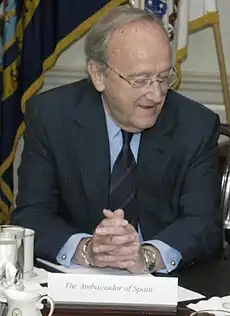High Representative for Bosnia and Herzegovina
The High Representative for Bosnia and Herzegovina, together with the Office of the High Representative (OHR) in Bosnia and Herzegovina, were created in 1995 immediately after the signing of the Dayton Agreement which ended the 1992–95 Bosnian War. The purpose of the High Representative and the OHR is to oversee the civilian implementation of the Dayton agreement. They also serve to represent the countries involved in the implementation of the Dayton Agreement through the Peace Implementation Council (PIC).
| High Representative for Bosnia and Herzegovina | |
|---|---|
 | |
| Inaugural holder | Carl Bildt 14 December 1995 |
| Formation | Dayton Peace Agreement 14 December 1995 |
| Salary | € 24.000 monthly |
| Website | www |
 |
|---|
| This article is part of a series on the politics and government of Bosnia and Herzegovina |
|
|
So far, all of the High Representatives named have been from European Union countries, while their principal deputies have been from the United States. The Principal Deputy High Representative serves as International Supervisor for Brčko, representing the international community in the Brčko District.
Due to the vast powers of the High Representative over Bosnian politics and essential veto powers, the position has also been compared to that of a viceroy.[1][2][3][4]
Legal basis in the Dayton Peace Agreements
The Dayton Agreement created the legal basis for the OHR. Its Annex 10 provides for the institution of the Office of the High Representative (OHR) in Bosnia and Herzegovina to oversee the civilian implementation of the agreement, representing the countries involved in the Dayton Accords through the Peace Implementation Council.
The "Bonn Powers" of the OHR
At its December 1997 meeting in Bonn, the Peace Implementation Council agreed in granting further substantial powers to the OHR, in order to avoid the implementation of the Dayton Agreement being delayed or obstructed by local nationalist politicians. The OHR was requested to:
- adopt binding decisions when local parties seem unable or unwilling to act;
- remove from office public officials who violate legal commitments or, in general, the DPA.[5][6]
The Bonn powers were extensively used by the OHR in the following decade. Some examples include the adoption of the Defence reform in April 2003, with the suppression of the Supreme Defence Council of the Republika Srpska, and the amendment of Entity Constitutional Laws.[6]
Until 2004, the OHR had dismissed a total of 139 officials, including judges, ministers, civil servants and members of parliaments, sometimes along with freezing their bank accounts. After the 2002 elections, the OHR scrutinised all political candidates for major ministerial positions at Entity and State level.[6]
Criticisms of the action of the OHR through its Bonn powers include:[6][7]
- the lack of accountability of his position, which is only responsible to the Peace Implementation Council;
- the lack of appeal of his decisions, which are not bound on a preliminary hearing of the concerned persons, and which have immediate effect. Removals may in some cases also impose a life-ban on public offices.
The Parliamentary Assembly of the Council of Europe, which Bosnia and Herzegovina had joined in 2002, has voiced complaints against the actions of the OHR, requiring it to transfer his powers to the Bosnian authorities as soon as possible.[8]
The OHR's prolonged interference in the politics of Bosnia and Herzegovina is also considered to be one of the causes of the low commitment of citizens towards the state (shown by low voter turnout) and of low accountability of politicians (whose actions are finally subject to external review).[6]
Fusion with the EUSR post
Between 2002 and 2011 the High Representative also served as the European Union Special Representative to Bosnia and Herzegovina.[9][10]
Under Christian Schwarz-Schilling, the OHR seemed to soften its invasiveness, thanks to pressures from the Council of Europe and a growing EU involvement. The number of OHR legislative initiatives and of dismissed officials lowered.[6]
On 27 February 2008, the PIC decided to end the High Representative's mandate on 30 June 2008. The EU decision to shut down the OHR by June 2007 unexpectedly aroused disappointment and concern in the Bosnian population, NGOs, and politicians.[6] However, since the PIC February 2008 review, it was decided to extend that mandate indefinitely until a set of positive benchmarks have been fulfilled.[11]
The "double hatting" between EUSR and OHR was discontinued in 2011, when the EU representative post was fused between the EUSR and the head of the EU delegation.
Conditions for closure of the Office of the High Representative

In February 2008 the Peace Implementation Council set the conditions for closure of the OHR. The most critical issues will be considered objectives to be achieved by the BiH authorities before transition from OHR to a European Union presence can take place. From a long list of known priorities the PIC selected the key ones for transition, for closure of OHR:[11]
- Resolution of State Property
- Resolution of Defence Property
- Completion of the Brčko Final Award
- Fiscal Sustainability of the State – completed as of May 2010, should be continuously sustained[12]
- Entrenchment of the Rule of Law – completed as of May 2010, should be continuously sustained[12]
In addition to these objectives there are also two conditions:
- signing of the Stabilisation and Association Agreement – completed on 16 June 2008
- positive assessment of the situation in BiH by the PIC Steering Board – to be assessed after all others are completed
Additional non-written condition to be enforced through the "assessment by the PIC Steering Board" final condition, was adopted later by the US and some EU countries:[13]
- reform of the constitution to comply with ECHR decision of December 2009
Closure of the OHR is considered by the Steering Board of the Peace Implementation Council to be a pre-condition for EU membership and even for candidate status.[13][14]
List of High Representatives
| # | Portrait | Officeholder | Lifespan | Term of office | Country | |
|---|---|---|---|---|---|---|
| 1 |  |
Carl Bildt | (born 1949) | 14 December 1995 | 17 June 1997 | |
| 2 |  |
Carlos Westendorp | (born 1937) | 18 June 1997 | 17 August 1999 | |
| 3 | _03.jpg.webp) |
Wolfgang Petritsch | (born 1947) | 18 August 1999 | 26 May 2002 | |
| 4 | _(cropped).jpg.webp) |
Paddy Ashdown | (1941–2018) | 27 May 2002 | 31 January 2006 | |
| 5 |  |
Christian Schwarz-Schilling | (born 1930) | 1 February 2006 | 30 June 2007 | |
| 6 |  |
Miroslav Lajčák | (born 1963) | 1 July 2007 | 28 February 2009 | |
| 7 | .jpg.webp) |
Valentin Inzko | (born 1949) | 1 March 2009 | Incumbent | |
List of Principal Deputy High Representatives
The second-ranking official at the Office of the High Representative carries the title of "Principal Deputy High Representative (PDHR)." For many years, the individual filling that role has been an official of the United States Government, in most cases a career Foreign Service Officer of the U.S. Department of State. Throughout much of OHR's earlier history, there were also individuals who held the title of "Deputy High Representative," a rank just below that of the PDHR.
| # | Officeholder | Born | Term of Office | Country | ||
|---|---|---|---|---|---|---|
| Raffi Gregorian | 1964 | October 2006 | August 2010 | United States | ||
| Roderick W. Moore | 1964 | September 2010 | October 2013 | United States | ||
| Tamir G. Waser | October 2013 | August 2014 | United States | |||
| David M. Robinson | 1955 | September 2014 | June 2015 | United States | ||
| Bruce G. Berton | 1961 | September 2015 | October 2017 | United States | ||
| Dennis Walter Hearne | October 2017 | November 2018 | United States | |||
| Michael Scanlan | February 2019 | Incumbent | United States | |||
See also
- EUFOR Althea – European peacekeeping force for overseeing the military implementation of the Dayton agreement.
- European Union Police Mission in Bosnia and Herzegovina – Police mission in the framework of the European Union's Common Foreign and Security Policy, helping local police with organized crime and police reform.
- Special Representative of the Secretary-General for Kosovo
- Bans of Bosnia
References
- http://www.ohr.int/interview-christian-schwarz-schilling-high-representative-for-bih-the-last-bosnian-viceroy-4/
- A Biographical Encyclopedia of Contemporary Genocide: Portraits of Evil and Good, p. 25, at Google Books
- https://www.economist.com/europe/1998/09/03/carlos-westendorp-bosnias-euro-spanish-viceroy
- https://www.economist.com/eastern-approaches/2011/04/13/two-visions-for-bosnia
- PIC Bonn 1997 conclusions
- Giulio Venneri, Modelling States from Brussels?, December 2007
- Matthew Parish, Demise of the Dayton Protectorate, J.Intervention and Statebuilding, Vol. 1 Special Supplement Archived 2015-01-13 at the Wayback Machine
- Council of Europe, Honouring of obligations and commitments by Bosnia and Herzegovina, 2004
- "EU Special Representative in Bosnia and Herzegovina". European Union External Action. Retrieved 2012-11-23.
- Vogel, Toby (9 July 2009). "Cypriot threats could affect role of top envoy in Bosnia". European Voice. Retrieved 2 October 2010.
- Press conference by the High Representative Miroslav Lajčák following the Peace Implementation Council Steering Board session in Brussels on 26–27 February 2008
Office of the High Representative, 27 Feb 2008, accessed 8 June 2016 - 37th Report of the High Representative for Implementation of the Peace Agreement on Bosnia and Herzegovina to the Secretary-General of the United Nations Archived 2011-02-28 at the Wayback Machine
- EU to end visa regime for Bosnia in November
- Communiqué of the Steering Board of the Peace Implementation Council Archived 2013-02-08 at the Wayback Machine
External links
- Official website

- Reports of the High Representative for Implementation of the Peace Agreement on Bosnia and Herzegovina to the Secretary-General of the United Nations
- "Bosnia: Europe's time to act", International Crisis Group report, 11 January 2011; on the scenarios of closure of the OHR and the transfer of EUSR powers to the EU delegation in Sarajevo.